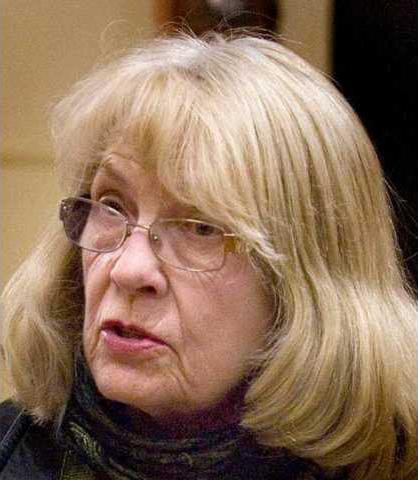By Jim Misunas
jmisunas@gbtribune.com
LARNED — Nine nurses at Larned State Hospital have been disciplined and held responsible for the death of a 76-year-old patient.
But six registered nurses and three licensed practical nurses believe they were targeted as scapegoats while supervising doctors and administrative personnel have largely escaped responsibility and accountability for the death of the patient.
“You are putting your life on the line working with an unpredictable psych patient,” said registered nurse Corinne Wray to a Topeka Capital Journal reporter. “You are putting your license on the line because you never know what you are going to do that they are going to nail you for whether you do it or not.”
There was a physician’s order on record that the patient’s catheter be changed monthly. Records show it was replaced in January 2012, but the next switch apparently didn’t occur until June 2012. A death certificate indicated the death was related to urosepsis and neurogenic bladder with an infected catheter.
But Stephanie Harper, an LPN, said no autopsy was performed when the patient was cremated to confirm that finding.
Georgia Briery, a registered nurse who has served as a director of nursing, asked, “Unless they did a post, how do they don’t know what he died of?”
Daun Anderson, a registered nurse who was fired, said the patient’s diagnosis was done at Pawnee Valley Community Hospital, according to the Capital Journal.
“This diagnosis was given by a doctor who worked at the hospital at Pawnee Valley several days later after reviewing the chart,” said Anderson. “The only thing that was a matter of record for him was five days before he been identified as having a urinary infection. His blood pressure and temperature was too low. We sent him to the hospital. We expected to see him back.”
Anderson told the Capital Journal that she is at a career crossroads, nearing retirement.
“My career is basically destroyed. I can’t build up any more retirement,” Anderson said. “I’ve been a psych nurse for 9 years and I don’t want to go back into acute care nursing because I’ve lost my skills.”
LSH and state department of aging officials moved to dismiss three nurses who were working shifts on the west wing in October, 2012. Six nurses were suspended without pay for 30 days. They were notified by letter signed by Thomas Kinlen, LSH’s superintendent, accusing them of abuse or neglect of a patient.
“We have our reputation that stands behind us,” said Charlotte Biays, a registered nurse whose suspension appeal is pending. “All my years in nursing practice, I haven’t been accused of wrongdoing. I have a good record behind me. We have been violated and been treated unfairly. Our patients have suffered.”
Wray questioned whether replacement of catheters by LSH nurses was within their scope of practice. She said a policy relating to catheters was adopted on July 7, 10 days after the man’s death.
“The problem, from their perspective, was we didn’t follow policy,” Wray told the Capital Journal. “How can I be expected to follow a policy that was not in existence until after the man died?”
Briery said none of the nurses felt changing a catheter was something they should perform.
“I never once thought that this was a nursing thing to do,” she told the Capital Journal. “The way the order was written, it looked like a doctor was going to do it.”
“I called the state board of nursing after we were accused of this and we received the letters.
She said, “They can’t possibly believe that many nurses could make the same mistake and not have it be a system failure. The things were not on place for us to do our job. It’s a system failure.”
Wray told the Capital Journal that the facility allowed medical doctors to issue medical orders. A psychiatric doctor would issue psychiatric orders.
“Whichever doctor renews their own order first, automatically renews other orders,” Wray said. “The psychiatrist renewed the order to have the catheter changed monthly, but didn’t follow up to make sure it was being done. When a psychiatrist renews an order, it gives him a certain amount liability to make sure, that for the well being of his patient, that the order is being followed. He was never named. In a med mal(practice) case, he would’ve been named as legally liable.”
Instead, Wray said the hospital administration appeared to hold the nurses to be totally responsible for the man’s death.
Perhaps the most surprised nurse who was disciplined was Stephanie Harper, who worked as an LPN with Dr. Wineetha Fernando. After an appeal of a 30-day suspension, Harper eventually served a 7-day suspension.
Harper, who was not directly involved with the patient’s care, filed an incident report that the patient required additional care. She was cited for not making catheter supplies available. Her standard care nursing rating was also lowered.
“I filled out the incident report, alerted Dr. Fernando and started the whole investigation concerning the patient,” Harper said.
She was shocked when she received a letter from LSH Superintendent Thomas Kinlen, citing abuse and neglect of a patient hours after LSH passed a Joint Commission review in October, 2012.
“Nobody expected that to happen,” she said. “The nurses involved had impeccable records. It was wrong what happened. I was viewed as someone who was a breath of fresh air and no one had ever had anything negative to say in my peer reviews.”
Dr. Fernando and nursing director Zena Jacobs are no longer working at Larned State Hospital.
A broader issue is whether the nurses responsible primarily for psychiatric care should be held responsible for patients who had previously received treatment at acute-care hospitals.
The nurses said they were still able to work after receiving their disciplinary notices labeling them a danger to hospital patients.
Larned State Hospital nurses pick up pieces after disciplinary actions




